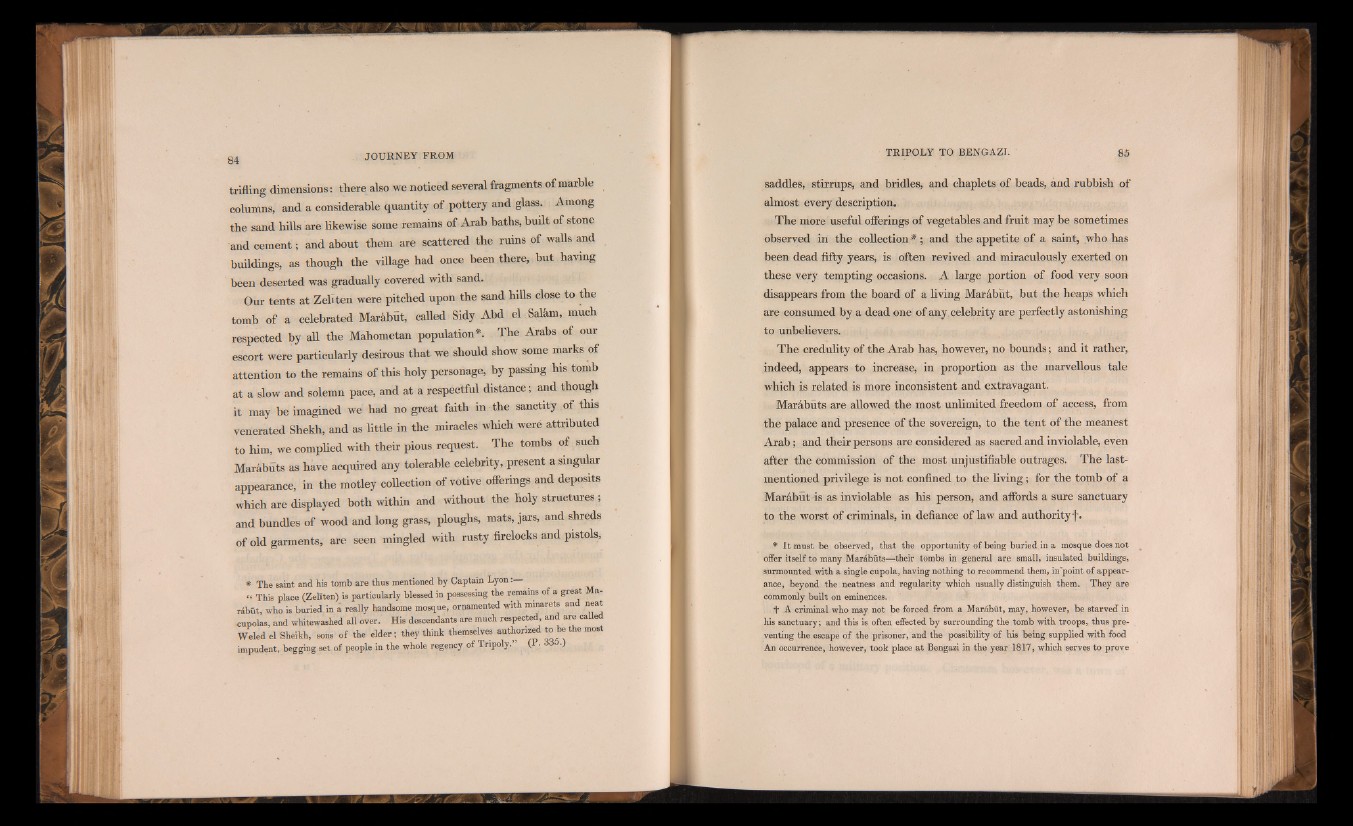
trifling dimensions: there also we noticed several fragments of marble
columns, and a considerable quantity of pottery and glass. Among
the sand hills are likewise some remains of Arab baths, built of stone
and cement; and about them are scattered the ruins of walls and
buildings, as though the village had once been there, but having
been deserted was gradually covered with sand.
Our tents at Zeliten were pitched upon the sand hills close to the
tomb of a celebrated Marhbut, called Sidy Abd el Salam, much
respected by all the Mahometan population*. The Arabs of our
escort were particularly desirous that we should show some marks of
attention to the remains of this holy personage, by passing his tomb
at a slow and solemn pace, and at a respectful distance; and though
it may be imagined we had no great faith in the sanctity .of this
venerated Shekh, and as little in the miracles which were attributed
to him, we complied with their pious request. The tombs of such
Marhbuts as have acquired any tolerable celebrity, present a singular
appearance, in the motley collection of votive offerings and deposits
which are displayed both within and without the holy structures ;
and bundles of wood and long grass, ploughs, mats, jars, and shreds
of old garments, are seen mingled with rusty firelocks and pistols,
* The saint and his tomb are thus mentioned by Captain Lyon:
“ This place (ZeEten) is particularly blessed in possessing the remains of a great Ma-
rabut, who is buried in i really handsome mosque, ornamented with minarets and neat
cupolas, and whitewashed all over. His descendants are much respected, and are called
Weledel Sheith, sons of the elder; they think themselves authorised to be the most
impudent, begging set of people in the whole regency of Tripoly.” (P. 335.)
saddles, stirrups, and bridles, and chaplets of beads, and rubbish of
almost every description.
The more useful offerings of vegetables and fruit may be sometimes
observed in the collection*; and the appetite of a saint, who has
been dead fifty years, is often revived and miraculously exerted on
these very tempting occasions. A large portion of food very soon
disappears from the board of a living Mar&but, but the heaps which
are consumed by a dead one of any , celebrity are perfectly astonishing
to unbelievers.
The credulity of the Arab has, however, no bounds; and it rather,
indeed, appears to increase, in proportion as the marvellous tale
which is related is more inconsistent and extravagant.
Mariibuts are allowed the most unlimited freedom of access, from
the palace and presence of the sovereign, to the tent of the meanest
Arab; and their persons are considered as sacred and inviolable, even
after the commission of the most unjustifiable outrages. The last-
mentioned privilege is not confined to the living; for the tomb of a
Mar&but is as inviolable as his person, and affords a sure sanctuary
to the worst of criminals, in defiance of law and authority f.
* It must be observed, that the opportunity of being buried,in a mosque does not
offer itself to many Marabuts—their tombs in general are small, insulated buildings,
surmounted with a single cupola, haying nothing to recommend them, in’point of appearance,
beyond the neatness and regularity which usually distinguish them. They are
commonly built on eminences.
t A criminal who may not be forced from a Mar&but, may, however, be starved in
his sanctuary; and this is often effected by surrounding the tomb with troops, thus preventing
the escape of the prisoner, and the possibility of his being supplied with food
An occurrence, however, took place at Bengazi in the year 1817, which serves to prove